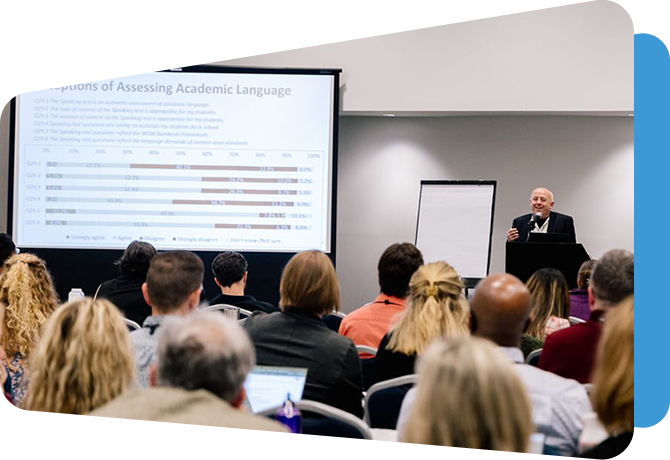Research Areas
The goal of research at WIDA is to promote excellent educational opportunities and inclusive practices for PreK-12 multilingual learners that facilitate and sustain the development of language, literacy, disciplinary knowledge, and agency our learners need to flourish in a variety of contexts in school and beyond. Our research supports transformative and innovative practices, products and services, and it informs the decision-making needs of educators and policymakers who serve our multilingual children and youth.
Educational Practices
WIDA researchers study language development and educator practices that promote student engagement in disciplinary learning. Research in this area aims to enhance collaboration and reciprocal learning with internal and external partners, and ensure that our projects contribute to transformative and innovative practices that lead the field of multilingual education and promote equal educational opportunities for multilingual learners.
Inclusive Teaching and Learning
WIDA researchers collaborate with states, districts, schools, and national experts to explore how teachers and students learn. The purpose of this work is to inform professional learning initiatives in and outside of WIDA; guide the development of resources for educators, students, and families; and expand our collective understanding of the structures and practices that facilitate inclusive educational practices and support student engagement in disciplinary learning and teachers’ professional growth.
Indigenous Languages and Cultures
WIDA is committed to engaging in work that supports language revitalization and continuation and the preservation and strengthening of a community’s culture. Our researchers have partnered with school districts to create language proficiency assessments for the Indigenous languages in these districts. Our researchers work closely with administrators, teachers, and community members to provide test development support and to ensure the technical quality and cultural appropriateness of the assessments.
Innovation and Technology
Our researchers continually work to ensure our products and services can effectively support and positively impact our multilingual learners and the educators who serve them. A significant focus of this work is on innovation and technology which aims to explore, identify, and discover inventive solutions to address the unique needs of our multilingual students and educators. This is accomplished through literature review, research, and demonstration of more effective high-quality products, processes, services, tools and technologies that are viable within the complex conditions of our PreK-12 schools.
Policy
Our researchers are thought leaders in the field of multilingual learner education, and their research continues to inform policy that promotes the academic and social success of multilingual learners. This research includes evaluation of the design, implementation, and effects of programs and policies that affect multilingual learners in our PreK-12 U.S. schools. Our researchers work closely with policymakers and practitioners at the local, state, and national levels to ensure that research outcomes are meaningful and practicable to inform decisions that have a positive impact on our multilingual learners.
Psychometrics
Our researchers and psychometricians continually work to ensure the psychometric quality of our measures, and their work is foundational to our item and test design, the accessibility of our assessments, the reliability and validity of our assessments’ outcomes, and the appropriate interpretation and uses of our assessments’ results. Their work contributes to the accuracy with which we can quantify the language knowledge, skills, and abilities of our multilingual learners as well as the insights we can gain about their language development and proficiency. Our researchers and psychometricians work closely with the Center for Applied Linguistics and Data Recognition Corporation, along with the WIDA Technical Advisory Committee.
Technical Assistance
Our researchers provide our states with needs-driven support services. Our technical assistance includes consultation and resources and/or services that can help states ensure compliance with state and federal assessment and accountability policies. Our work is reflective of WIDA’s values related to service and collaboration, and our researchers also work with states and districts to examine the range of implementation and policy contexts and their implications for the viability, as well as opportunities for improvement, of resources and programs serving our multilingual learners.





